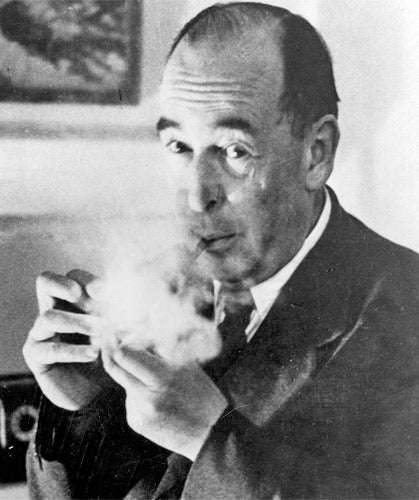Rescued from the bonfire, the lost work of C S Lewis

Your support helps us to tell the story
From reproductive rights to climate change to Big Tech, The Independent is on the ground when the story is developing. Whether it's investigating the financials of Elon Musk's pro-Trump PAC or producing our latest documentary, 'The A Word', which shines a light on the American women fighting for reproductive rights, we know how important it is to parse out the facts from the messaging.
At such a critical moment in US history, we need reporters on the ground. Your donation allows us to keep sending journalists to speak to both sides of the story.
The Independent is trusted by Americans across the entire political spectrum. And unlike many other quality news outlets, we choose not to lock Americans out of our reporting and analysis with paywalls. We believe quality journalism should be available to everyone, paid for by those who can afford it.
Your support makes all the difference.The author CS Lewis loved reading his translation of Virgil's epic poem the Aeneid to fellow Oxford-based writers, including JRR Tolkien, at the Inklings, the famous informal literary discussion group they both frequented.
The translation was believed to have been lost in a bonfire in 1964, a year after the author's death. Now, nearly 50 years later, it has resurfaced. The work was apparently rescued by Lewis's former secretary, Walter Hooper, 79. The complete translation is to be published in the book CS Lewis's Lost Aeneid, which is out next month.
"Although it had been known that Lewis had worked on this translation, no one realised that portions still survived until Walter began sifting through his material," said the book's editor, Andy Reyes. "The bonfire, it was assumed, had consumed the most significant fragments of Lewisiana."
Lewis first started work on the translation in 1935, when he was 37, and it is believed he returned to it several times throughout his life.
Another fragment of Lewis's writing which was published after being thought lost was his abandoned novel The Dark Tower. In the book's introduction, Hooper describes how Lewis's brother, Major Warren Lewis, began clearing out The Kilns, Lewis's former home, "preparatory to moving to a smaller house".
"Major Lewis, after setting aside those papers which had special significance for him, began disposing of the others," wrote Hooper. "Thus it was that a great many things which I was never able to identify found their way on to a bonfire which burned steadily for three days."
According to Hooper, Lewis's gardener, Fred Paxford, who was instructed to burn the author's manuscripts, knew that Hooper had "the highest regard for anything in the master's hand". The gardener was instructed to burn a number of notebooks, but managed to convince Major Lewis to delay until Hooper could see them.
"By what seems more than coincidence, I appeared at The Kilns that very day and learned that unless I carried the papers away with me that afternoon they would indeed be destroyed," Hooper wrote. "There were so many that it took all my strength and energy to carry them back to Keble College." For the past 46 years, Hooper has spent his time sifting through the saved material before it is transported to Oxford's Bodleian Library. Four years ago, he realised that fragments of the famous Aeneid translation, referred to by Tolkien in his own letters, had escaped his attention. Since then he has worked with Reyes to piece together the translation, which exists in fragments spread across several notebooks.
Reyes and Hooper began collaborating when Reyes was a visiting scholar at Oxford University's Wolfson College. "He asked me to write out any notes that would help a general reader understand the text," said Reyes. "These notes were a glossary explaining classical allusions which were too long to be incorporated into a new edition of Lewis's collected poetry, and so Walter wondered if the Aeneid translation could stand on its own as a volume."
Lewis absorbed himself in Greek mythology from an early age. He read Greek and Latin literature along with philosophy and ancient history at Oxford in the 1920s. He was a fellow at Magdalen College, Oxford, between 1925 and 1954, and later was the first Professor of Medieval and Renaissance English at the University of Cambridge.
Join our commenting forum
Join thought-provoking conversations, follow other Independent readers and see their replies
Comments